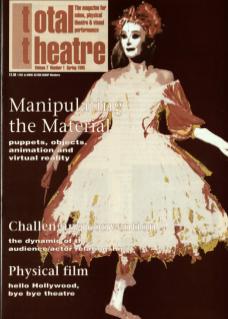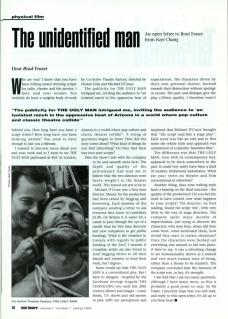Who are you? I know that you have been writing award winning scripts for radio, theatre and the movies. I have read your resume. You certainly do have a weighty body of work behind you. How long have you been a script writer? How long have you been winning awards? You seem to have enough to last you a lifetime.
I wanted to discover more about you and your work and so I went to see The Ugly Man performed at BAC in London, by Co-Active Theatre Factory, directed by Fenton Gray and Michael D'Cruze.
The publicity for The Ugly Man intrigued me, inviting the audience to ‘an isolated ranch in the oppressive heat of Arizona in a world where pop culture and classic theatre collide’. A string of questions began to form: How did the story come about? What kind of things do you find disturbing? Do they find their way into your scripts? After the show I met with the company to try and unearth more facts. The depth and quality of the performance had lead me to believe that the two directors were heavyweights in the theatre world. This turned out not to be so – Michael D'Cruze was a first time director. Money for the production had been raised by begging and borrowing, each member of the company sending a letter to ask everyone they know to contribute £5. (In Britain it is easier for a camel to pass through the eye of a needle than for first-time directors and new companies to get public funding.) What is the situation in Canada with regards to public funding of the Arts? I wonder if Canadian artists are also forced to send begging letters to all their friends and enemies to fund their work, but I digress.
Some would say that The Ugly Man is a conventional play. But I have to disagree – inspired by the Jacobean revenge tragedy The Changeling you used late 20th Century idioms and images – comic books, TV shows and old movies – to play with our perceptions and expectations. The characters, driven by their own personal desires, hurtled towards their destruction without apology or excuse. The pace and dialogue give the play a filmic quality. I therefore wasn't surprised that Michael D'Cruze thought that ‘the script read like a stage play’. Each scene was like an edit and in this sense the whole style and approach was reminiscent of a Quentin Tarantino film.
The difference was that The Ugly Man, even with its contemporary feel, appeared to be stuck somewhere in the past. It could very easily have been a kind of modern Hollywood melodrama. What are your views on theatre and film, conventional or otherwise?
Another thing, does your writing style have a bearing on the final outcome – the quality of the production? Do you feel the need to have control over what happens to your scripts? The director, on first reading, found the script 'dry', with very little in the way of stage direction. The company spent many months of improvisation, just trying to discover the characters; who were they, where did they come from, what motivated them, how would they react to certain situations? Once the characters were fleshed out everything else seemed to fall into place. (I have to say, it was a refreshing change to see homosexuality shown as a natural and very much human state of being, rather than a theme to be studied.) The company concluded that the bareness of the script was, in fact, its strength.
I am told that I ask too many questions, although I have many more, so this is probably a good point to stop. So Mr Fraser, I sincerely hope that you will read, and reply to this open letter. It's all up to you from here!

